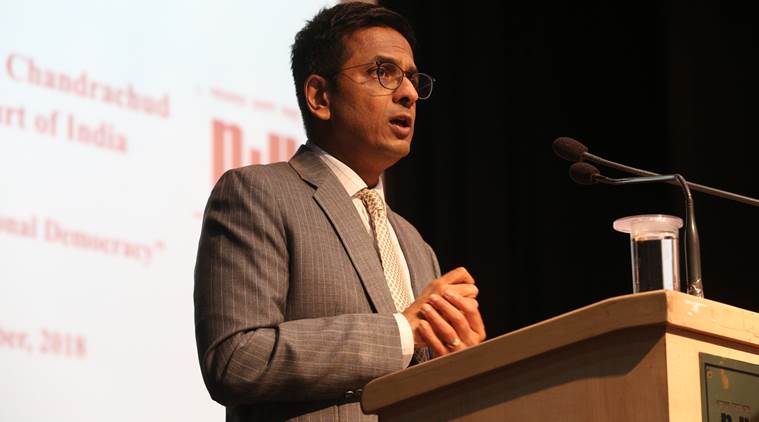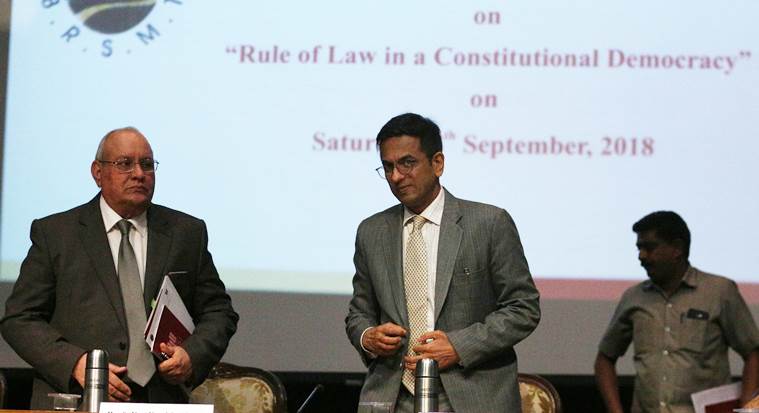 Justice Chandrachud at NLU in New Delhi. (Express Photo By Amit Mehra)
Justice Chandrachud at NLU in New Delhi. (Express Photo By Amit Mehra)
Two days after he authored a concurring judgement in the landmark Supreme Court verdict that decriminalised homosexuality, Justice D Y Chandrachud Saturday expressed disappointment at the Centre’s decision to leave “sensitive issues” to the “wisdom of the court” and asked why “politicians sometimes hand over power to judges”.
Referring to the Centre’s affidavit, which left the decision on petitions challenging the validity of Section 377 of the Indian Penal Code to the “wisdom” of the Supreme Court, Justice Chandrachud said: “… But the legislature and government leave it to the court to decide sensitive issues such as the power to administer and govern the National Capital, issue of passive euthanasia and also challenge to Section 377 besides other sensitive issues.”
“Why do politicians sometimes hand over power to judges, and we see that happening in the Supreme Court every day. We saw that in 377 where the government told us that we are leaving this to the wisdom of the court, and this ‘wisdom of the court’ was too enticing a principle for me not to respond so I responded in my judgment the other day,” he said.
Quoting from his 180-page concurring opinion, Justice Chandrachud said: “It is well for a judge to remind himself or herself of the fact that flattery is often the graveyard of the gullible.” He was part of the five-judge Constitution Bench, which Thursday scrapped the colonial-era Section 377, along with Chief Justice of India Dipak Misra and Justices R F Nariman, A M Khanwilkar and Indu Malhotra.
Justice Chandrachud was speaking Saturday on the topic, “Rule of Law in Constitutional Democracy”, at the 19th Annual Bodh Raj Sawhny Memorial Oration 2018, organised by National Law University, Delhi.
He also said that the judgment in the challenge to Section 377 really represented “the battle between laws of a colonial origin and laws which must truly represent Constitutional values.”
“There is so much of life beyond the law”, he said, adding, “We understand law when we understand life, which exists beyond the law… every day of our life, judges also learn of the limitation of the work, which they do. In terms of its ability to answer injustice.”
 Justice Chandrachud also said that the Section 377 ruling emphasised the need for equal citizenship. (Express Photo By Amit Mehra)
Justice Chandrachud also said that the Section 377 ruling emphasised the need for equal citizenship. (Express Photo By Amit Mehra)
According to Justice Chandrachud, the favourite part of his judgement was where he quoted the lyrics of the song ‘Democracy’ by Leonard Cohen. Reading it aloud, he said, “Democracy. It’s coming through a hole in the air. It’s coming from the feel, that this ain’t exactly real, or it’s real, but it ain’t exactly there. From the wars against disorder, from the sirens night and day, from the fires of the homeless, from the ashes of the gay. Democracy is coming.”.
In his concurring verdict, Justice Chandrachud — in line to become Chief Justice of India in November 2022 till November 2024 — said that it was the duty of the court to address the challenge to the Constitutional validity of Section 377. “Constitutional issues are not decided on concession. The statement of the union government does not concede to the contention of the petitioners that the statutory provision is invalid. Even if a concession were to be made, that would not conclude the matter for this Court. All that the stand of the government indicates is that it is to the ‘wisdom’ of this Court that the matter is left,” he wrote.
Justice Chandrachud also said that the Section 377 ruling emphasised the need for equal citizenship. “Johar (Navtej Johar vs Union of India) also emphasises one critical ingredient of ROL (Rule of Law), which I think we need to emphasise today more than ever, which is that the ROL if it has to flourish in a Constitutional democracy, has to flourish in a society which is based on a diversity of cultures, in a diversity of ideologies, in a plural society where individuals must be free,” he said.
“We are not just empowering them whose rights we recognised. We are not in that sense recognising the entitlements of others. I think more important or equally important is the effort of the Constitution to transform ourselves, when we recognise the freedom of others,” he said.
“Often, we believe in our own freedoms. We do not dwell on the importance of recognising freedoms of others.”
Justice Chandrachud said that this concern about the need to harmonise pre-Independence or colonial laws with the ethos of Constitutional jurisprudence was reflected in the judgment.
He said that out of the many layers in the judgment, the most significant part was where “we try and give individual dignity, the autonomy, the choice and liberty of an individual, some substantive content”.
“And therefore, you find that in some parts of the judgment, there are references to the fact that says ‘I am as I am and let me be as I am’. There are other judgments which do not regard this right ‘to be that I am’ as something that is immutable,” he said.
Noting that Section 377 rested on deep-rooted gender stereotypes, he said that “what 377 did essentially was to say that this is how a man should be and this is how a woman should be. And, this not what a man is and this is not what a woman is.”
“LGBT individuals, as well as those who do not conform to societal expectations of sexual behaviour, defy gender stereotypes,” he said, quoting from his judgment.
“Article 15 also uses the word ‘only’. It says that no citizen shall be discriminated only on grounds of religion, race, caste, sex, place of birth. If you follow a very formalistic ‘Rule of Law’ approach the word ‘only’ means the moment you discriminate against an individual on the ground of sex and something else, that discrimination is valid,” he said.